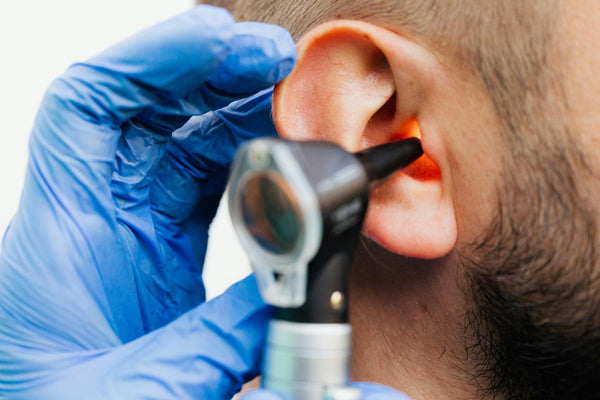
An itchy ear is a common and often frustrating sensation. It can be caused by something as simple as dry skin, a small build-up of wax, or mild irritation from soaps or allergies. In most cases, the cause is minor - but constant itching, redness, or pain may be a sign of something that needs professional care.
At Leightons, our expert audiologists can help you understand what’s behind the irritation and guide you to safe, effective relief.
What causes itchy ears?
Itchy ears occur when the delicate skin inside or around the ear becomes irritated. This can happen for many reasons, ranging from environmental factors to underlying skin or ear conditions. Some causes are external - such as dryness or over-cleaning - while others come from infection or allergic reaction.
Understanding the cause is the first step toward lasting relief.
Common causes of itchy ears
Several everyday factors can trigger itching in or around the ears:
- Dry skin or eczema: The ear canal has very thin skin that can become dry, especially in cold weather or if you’re prone to eczema.
- Wax build-up: Excess ear wax can trap dirt or moisture, causing irritation or itching.
- Mild ear infection (otitis externa): Also known as swimmer’s ear, this can make the ear red, sore, and itchy.
- Allergies or sensitivities: Some people react to hair products, metal earrings, or hearing aid materials.
- Over-cleaning: Using cotton buds or inserting objects into the ear can irritate or damage the skin, making itching worse.
Symptoms to watch for
Most ear itching settles quickly, but if it continues or comes with other symptoms, it may need attention. Signs to look out for include:
- Persistent or severe itching
- Redness or flaky skin
- Pain, swelling, or warmth
- Fluid, wax, or discharge from the ear
- Muffled hearing or a blocked feeling
If any of these symptoms occur, avoid scratching or using cotton buds and get your ears checked by a professional.
Safe ways to relieve itchy ears
Here are some safe and effective ways to soothe itchy ears:
- Avoid inserting objects: Don’t use cotton buds or fingers - this can damage skin and worsen irritation.
- Keep ears dry: After bathing or swimming, gently dry the outer ear with a towel.
- Use gentle skincare: Avoid fragranced soaps, hair sprays, or lotions near your ears.
- Don’t over-clean: The ear canal naturally cleans itself; too much cleaning can remove protective oils.
- Moisturise dry outer ears: If the skin around the ear opening feels dry, a small amount of unperfumed moisturiser may help (avoid putting anything inside the ear canal).
If itching persists or worsens, professional assessment is the safest next step.
When to see an audiologist or GP
You should seek advice from a hearing care specialist or GP if:
- Itching lasts more than a few days
- You notice pain, swelling, or discharge
- The itching is affecting your sleep or comfort
- You wear hearing aids and suspect irritation or allergy
Leightons’ audiologists can carry out a safe, detailed ear examination to check for infection, wax build-up, or other causes. If necessary, we’ll provide gentle ear wax removal or refer you to your GP for further care.
How Leightons can help
Our expert team offers professional, gentle ear care designed around you. During your appointment, we can:
- Examine your ears using safe, non-invasive tools
- Identify whether the itching is due to dryness, wax, or infection
- Provide professional microsuction ear cleaning if wax is contributing
- Offer practical advice to prevent irritation and maintain healthy ears
At Leightons, we focus on your comfort and long-term ear health - helping you feel confident and itch-free.
Preventing itchy ears
A few simple habits can help keep your ears healthy and comfortable:
- Avoid inserting anything into your ears
- Keep ears clean and dry, especially after swimming
- Manage allergies or eczema with suitable treatments
- Take care with hearing aids - clean them regularly and ensure a proper fit
- Book routine ear health checks if you’re prone to irritation or wax build-up







